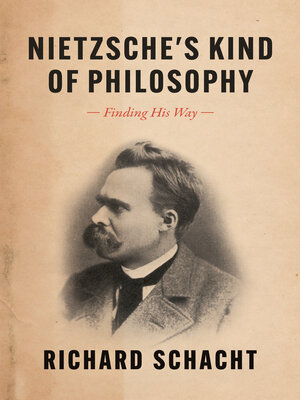
Sign up to save your library
With an OverDrive account, you can save your favorite libraries for at-a-glance information about availability. Find out more about OverDrive accounts.
Find this title in Libby, the library reading app by OverDrive.



Search for a digital library with this title
Title found at these libraries:
| Library Name | Distance |
|---|---|
| Loading... |
A holistic reading of Nietzsche's distinctive thought beyond the "death of God."
In Nietzsche's Kind of Philosophy, Richard Schacht provides a holistic interpretation of Friedrich Nietzsche's distinctive thinking, developed over decades of engagement with the philosopher's work. For Schacht, Nietzsche's overarching project is to envision a "philosophy of the future" attuned to new challenges facing Western humanity after the "death of God," when monotheism no longer anchors our understanding of ourselves and our world. Schacht traces the developmental arc of Nietzsche's philosophical efforts across Human, All Too Human, Daybreak, Joyful Knowing (The Gay Science), Thus Spoke Zarathustra, Beyond Good and Evil, and On the Genealogy of Morality. He then shows how familiar labels for Nietzsche—nihilist, existentialist, individualist, free spirit, and naturalist—prove insufficient individually but fruitful if refined and taken together. The result is an expansive account of Nietzsche's kind of philosophy.
In Nietzsche's Kind of Philosophy, Richard Schacht provides a holistic interpretation of Friedrich Nietzsche's distinctive thinking, developed over decades of engagement with the philosopher's work. For Schacht, Nietzsche's overarching project is to envision a "philosophy of the future" attuned to new challenges facing Western humanity after the "death of God," when monotheism no longer anchors our understanding of ourselves and our world. Schacht traces the developmental arc of Nietzsche's philosophical efforts across Human, All Too Human, Daybreak, Joyful Knowing (The Gay Science), Thus Spoke Zarathustra, Beyond Good and Evil, and On the Genealogy of Morality. He then shows how familiar labels for Nietzsche—nihilist, existentialist, individualist, free spirit, and naturalist—prove insufficient individually but fruitful if refined and taken together. The result is an expansive account of Nietzsche's kind of philosophy.







